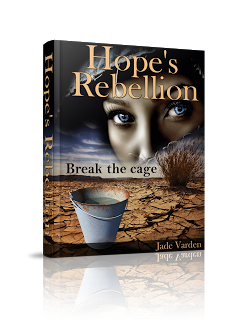Jade Varden's Blog, page 47
December 23, 2013
Hope's Rebellion: Free Sample
Published on December 23, 2013 09:30
Writing 101: You Don't Have to Be Gifted
There are those who say that writing is a talent. I say that it's a job. And to be an author, you don't have to be gifted or talented or even lucky. But you do have to be a hard worker, even if you've got all the other stuff already.
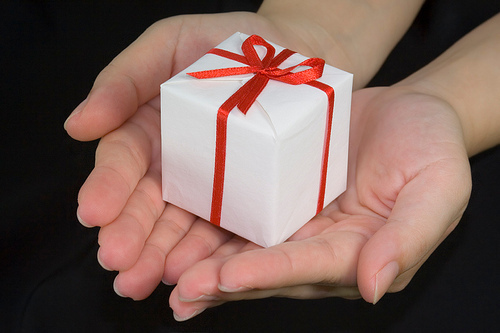
Talent Might Be a Myth
I'm not sure I believe in talent (perhaps because I haven't got any). Some of the most divine natural actors may never step off the community theater stage, and amazing singers are wilting away behind cash registers all over the country. It's fine to have talent, to be gifted, but at the end of the day it's a gift that gives you very little.
The highly gifted fail every single day at all sorts of things. The talented fall down and make missteps and struggle, and some of them flounder and never succeed at their dreams. But those who do achieve success usually have the same thing in common: they work hard.
Being a gifted writer may help you write a more perfect novel in the first draft, but you still have to edit it and rewrite it just the same as a not-so-gifted writer. It's all hard work. If you want to give yourself a gift as an author, work harder. Forget about talent, because you don't need it to write a book. Talent doesn't write books, but dedicated hard work will.

Talent Might Be a Myth
I'm not sure I believe in talent (perhaps because I haven't got any). Some of the most divine natural actors may never step off the community theater stage, and amazing singers are wilting away behind cash registers all over the country. It's fine to have talent, to be gifted, but at the end of the day it's a gift that gives you very little.
The highly gifted fail every single day at all sorts of things. The talented fall down and make missteps and struggle, and some of them flounder and never succeed at their dreams. But those who do achieve success usually have the same thing in common: they work hard.
Being a gifted writer may help you write a more perfect novel in the first draft, but you still have to edit it and rewrite it just the same as a not-so-gifted writer. It's all hard work. If you want to give yourself a gift as an author, work harder. Forget about talent, because you don't need it to write a book. Talent doesn't write books, but dedicated hard work will.
Published on December 23, 2013 05:30
December 22, 2013
Indie News: Mac App Aims to Serve Indies
Self-publishing a book? There's an app for that...now. Mac owners can make use of Vellum. If the functionality is as good as the name, writers are sure to be delighted with it. There's just one question: what the heck does a self-publishing app do?

iPublishing Because if an app can do all that tedious promotion and editing, count me in. But that's not exactly what Vellum does. Two former Pixar designers came together to create the app, which is designed to make it easier for writers to format and distribute their work.
But like many things in the world of self-publishing, there's a bit of a catch. The app itself is free. Actually using it to turn your manuscripts into ebooks, however, is not. It's going to cost you a smooth $50 a book, but there are some bundling options.
The vast majority of indie authors are lucky if they earn $50 in sales for every book they publish, and using the app isn't even the only cost. US residents have to pay for the copyright, and many authors are obliged to pay for professional cover art. Promotion, editing, reviews -- it can all cost money, and the app does none of these things.
Self-publishing a book is already pretty simple, even without a fancy app. Just take a look at the Kindle store, and you'll see exactly how easy it really is.

iPublishing Because if an app can do all that tedious promotion and editing, count me in. But that's not exactly what Vellum does. Two former Pixar designers came together to create the app, which is designed to make it easier for writers to format and distribute their work.
But like many things in the world of self-publishing, there's a bit of a catch. The app itself is free. Actually using it to turn your manuscripts into ebooks, however, is not. It's going to cost you a smooth $50 a book, but there are some bundling options.
The vast majority of indie authors are lucky if they earn $50 in sales for every book they publish, and using the app isn't even the only cost. US residents have to pay for the copyright, and many authors are obliged to pay for professional cover art. Promotion, editing, reviews -- it can all cost money, and the app does none of these things.
Self-publishing a book is already pretty simple, even without a fancy app. Just take a look at the Kindle store, and you'll see exactly how easy it really is.
Published on December 22, 2013 05:30
December 21, 2013
Books on Film: The Polar Express
Electric train are a modern symbol of Christmas, so what could be more seasonal than a story about a train that takes kids to the North Pole on Christmas Eve? I'm talking about The Polar Express, of course, and if you've got a TV in December you've probably seen it. But have you read the book?

The Book
Chris Van Allsberg wrote and illustrated The Polar Express, which was published in 1985. It's won several awards and it's a highly popular holiday book among kids and parents. If you've seen the movie, you already have a idea of what the illustrations look like.
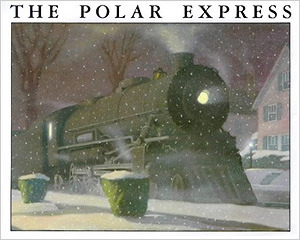
The story in the book introduces us to a young boy who does not believe in Santa Claus. This begins to change when the Polar Express arrives on his front lawn, all set to take him to the North Pole.
The Film
The Polar Express finally became a film in 2004. The project had big names attached to it early (Tom Hanks, Robert Zemeckis), so it was pretty much a guaranteed hit. Live action capture was used to make the animated characters look and move more realistically. The realism of The Polar Express sets it apart from many other animated holiday films.
The film centers on a young boy who is just on the crux of no longer believing in Santa Claus. As he goes to bed on Christmas Eve, he questions whether or not Santa actually exists. Before he drifts off to sleep, the peaceful night is interrupted...by the sound of a train.
It's the Polar Express, a train that takes children to the North Pole. Our hero waffles, but eventually he does jump onto the train. There is a lot of adventure, and he meets several other children, before the journey is complete. And when he does get to the North Pole, does he meet Santa Claus? You'll have to watch the film to find out.
What Got Adapted?
The Polar Express is a short children's book and frankly there isn't enough material for a feature-length film. So lots of stuff got added to the film that builds upon the original story. The know-it-all kid (voiced by Corey Feldman), the hobo ghost, the little girl and several other characters are added out of whole cloth.
Entire scenes were added to the film to create more story. The roller coaster moment, the rebellious journey through the North Pole, and all the ticket-punching business was fabricated for the sake of the movie.
The original book is beautifully illustrated and the short story will delight kids of all ages. The film has beautiful animation and Tom Hanks voices no less than 6 roles, so you want to see that for sure. Enjoy them both, and happy holidays!

The Book
Chris Van Allsberg wrote and illustrated The Polar Express, which was published in 1985. It's won several awards and it's a highly popular holiday book among kids and parents. If you've seen the movie, you already have a idea of what the illustrations look like.

The story in the book introduces us to a young boy who does not believe in Santa Claus. This begins to change when the Polar Express arrives on his front lawn, all set to take him to the North Pole.
The Film
The Polar Express finally became a film in 2004. The project had big names attached to it early (Tom Hanks, Robert Zemeckis), so it was pretty much a guaranteed hit. Live action capture was used to make the animated characters look and move more realistically. The realism of The Polar Express sets it apart from many other animated holiday films.
The film centers on a young boy who is just on the crux of no longer believing in Santa Claus. As he goes to bed on Christmas Eve, he questions whether or not Santa actually exists. Before he drifts off to sleep, the peaceful night is interrupted...by the sound of a train.
It's the Polar Express, a train that takes children to the North Pole. Our hero waffles, but eventually he does jump onto the train. There is a lot of adventure, and he meets several other children, before the journey is complete. And when he does get to the North Pole, does he meet Santa Claus? You'll have to watch the film to find out.
What Got Adapted?
The Polar Express is a short children's book and frankly there isn't enough material for a feature-length film. So lots of stuff got added to the film that builds upon the original story. The know-it-all kid (voiced by Corey Feldman), the hobo ghost, the little girl and several other characters are added out of whole cloth.
Entire scenes were added to the film to create more story. The roller coaster moment, the rebellious journey through the North Pole, and all the ticket-punching business was fabricated for the sake of the movie.
The original book is beautifully illustrated and the short story will delight kids of all ages. The film has beautiful animation and Tom Hanks voices no less than 6 roles, so you want to see that for sure. Enjoy them both, and happy holidays!
Published on December 21, 2013 05:30
December 19, 2013
Writing 101: Authors and Substance Abuse
"Write drunk, edit sober."
– Ernest Hemingway
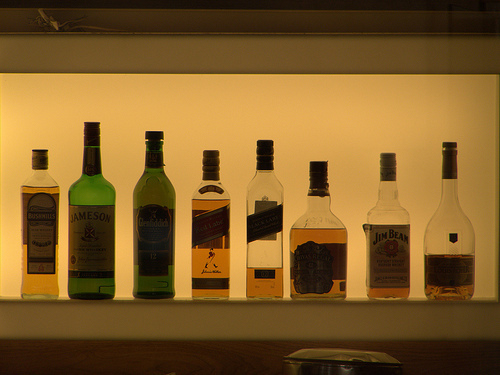
I giggled when I first saw that quote from Hemingway. I stopped smiling when I remembered that alcoholism eventually destroyed him...and lots of other great authors. When it comes to authors and substance abuse, this profession seems to have more than its fair share of drunks. And no matter how amazing these addicted authors are or were, no one should attempt to follow their soggy footsteps.
Losing the Battle
Start looking for authors who spent too much time looking at the bottom of a bottle, and you're going to find them. Hemingway battled alcoholism (and lost) for much of his life. He eventually took his own life despite his success and fame. Edgar Allen Poe, often regarded as the master of modern horror, had a serious alcohol problem. He died mysteriously, and the substance abuse definitely didn't help to prevent his untimely demise. Hunter S. Thompson was famously an addict. You can see something of what his life was like in Fear and Loathing in Las Vegas. There was probably no drug he did not try, and one day he shot himself in the head with a gun. Is the substance abuse linked to the suicide? Fans can only speculate, but going though the highs and lows of drug use surely did not help him with any emotional problems he may or may not have been experiencing.
Playwright Tennessee Williams, famous for Cat on a Hot Tin Roof and a whole host of other stories, also had issues with alcohol. Even Stephen King indulged, and things got so bad his friends and family staged an intervention to bring him back from the brink of substance abuse.
Authors and substance abuse have been linked a lot throughout history, and it's not a pattern that should be repeated. All due respect to Hemingway, but writing drunk or otherwise compromised is never a good idea. You're likely to spit out a bunch of words and plot that make no sense, and wading through that nonsense later will be a huge headache. Always write clear-headed. It's fine to indulge in a little alcohol with friends during a special event, but if you feel that you need to drink on a daily basis then you have a problem. Please get help for it. There is lots of help available.
Many of the authors who suffered from substance abuse died with very little money or happiness, often all alone, in very undignified ways. You don't want to leave that sort of legacy behind, to be a sad footnote in someone's blog post, to spend your talent swimming around inside of a whiskey bottle. Authors may turn to substances in order to combat the loneliness and the strong emotions that come with the job, but there are better ways to cope. Substance abuse will destroy you in the end, just as it destroyed so many other talented writers.
– Ernest Hemingway

I giggled when I first saw that quote from Hemingway. I stopped smiling when I remembered that alcoholism eventually destroyed him...and lots of other great authors. When it comes to authors and substance abuse, this profession seems to have more than its fair share of drunks. And no matter how amazing these addicted authors are or were, no one should attempt to follow their soggy footsteps.
Losing the Battle
Start looking for authors who spent too much time looking at the bottom of a bottle, and you're going to find them. Hemingway battled alcoholism (and lost) for much of his life. He eventually took his own life despite his success and fame. Edgar Allen Poe, often regarded as the master of modern horror, had a serious alcohol problem. He died mysteriously, and the substance abuse definitely didn't help to prevent his untimely demise. Hunter S. Thompson was famously an addict. You can see something of what his life was like in Fear and Loathing in Las Vegas. There was probably no drug he did not try, and one day he shot himself in the head with a gun. Is the substance abuse linked to the suicide? Fans can only speculate, but going though the highs and lows of drug use surely did not help him with any emotional problems he may or may not have been experiencing.
Playwright Tennessee Williams, famous for Cat on a Hot Tin Roof and a whole host of other stories, also had issues with alcohol. Even Stephen King indulged, and things got so bad his friends and family staged an intervention to bring him back from the brink of substance abuse.
Authors and substance abuse have been linked a lot throughout history, and it's not a pattern that should be repeated. All due respect to Hemingway, but writing drunk or otherwise compromised is never a good idea. You're likely to spit out a bunch of words and plot that make no sense, and wading through that nonsense later will be a huge headache. Always write clear-headed. It's fine to indulge in a little alcohol with friends during a special event, but if you feel that you need to drink on a daily basis then you have a problem. Please get help for it. There is lots of help available.
Many of the authors who suffered from substance abuse died with very little money or happiness, often all alone, in very undignified ways. You don't want to leave that sort of legacy behind, to be a sad footnote in someone's blog post, to spend your talent swimming around inside of a whiskey bottle. Authors may turn to substances in order to combat the loneliness and the strong emotions that come with the job, but there are better ways to cope. Substance abuse will destroy you in the end, just as it destroyed so many other talented writers.
Published on December 19, 2013 05:30
December 18, 2013
Justice, by Moonlight
"Varden sure does know how to tell a story and keep you intrigued."
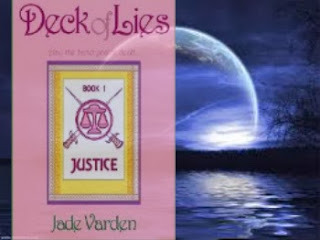
"If you like a book that will surprise you and keep you in suspense, pick up Justice by Jade Varden."
Moonlight Reader has reviewed Justice (Deck of Lies, #1). Read the full review to see the final rating!

"If you like a book that will surprise you and keep you in suspense, pick up Justice by Jade Varden."
Moonlight Reader has reviewed Justice (Deck of Lies, #1). Read the full review to see the final rating!
Published on December 18, 2013 14:30
Writing 101: Should You Be Using Matchbook?
Amazon has blazed a trail for today's indie authors. Their KDP program made it possible for millions of books to be published and sold. Amazon's newest invention for indies is the Matchbook program, and it could help the mega-site sell even more books. Should you be using it to sell more of yours?
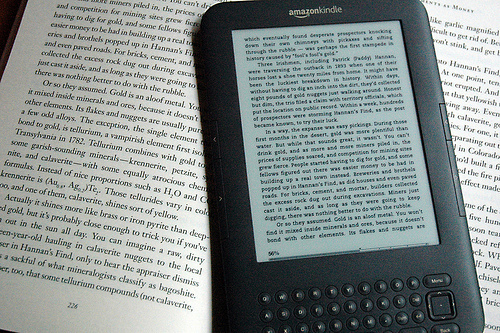
Amazon's Matchbook
If you haven't heard about Amazon's new program, it's no big deal. It's still pretty new. But you'll probably start hearing more about it soon. The Matchbook programs sells itself. Customers who buy a print copy of a book receive a free or highly discounted Kindle copy of the same. It's a great deal for the consumers, who may want their book in both print and electronic form to easily read between locations.
It's an amazing program for indie authors, too. The Matchbook program gives readers more incentive to buy print and ebook copies of your novel, because now they can get a discount. The result is that indie authors end up making even more money despite the reduced cost, because readers are buying the book twice. Best of all, authors don't have to be exclusive to Amazon in order to participate in Matchbook.
Should you be using this program? Absolutely! Anything that encourages readers to buy more books, and helps them do it, is something to be embraced. Adding books to the program will give you something new to promote, to boot.

Amazon's Matchbook
If you haven't heard about Amazon's new program, it's no big deal. It's still pretty new. But you'll probably start hearing more about it soon. The Matchbook programs sells itself. Customers who buy a print copy of a book receive a free or highly discounted Kindle copy of the same. It's a great deal for the consumers, who may want their book in both print and electronic form to easily read between locations.
It's an amazing program for indie authors, too. The Matchbook program gives readers more incentive to buy print and ebook copies of your novel, because now they can get a discount. The result is that indie authors end up making even more money despite the reduced cost, because readers are buying the book twice. Best of all, authors don't have to be exclusive to Amazon in order to participate in Matchbook.
Should you be using this program? Absolutely! Anything that encourages readers to buy more books, and helps them do it, is something to be embraced. Adding books to the program will give you something new to promote, to boot.
Published on December 18, 2013 05:30
December 17, 2013
Writing 101: How a Manuscript Becomes a Book
You can write and write and write, and until you take certain steps you still haven't created a book. Until a manuscript becomes a book, it's just a bunch of words. And in the main, there are only two different routes you can take in order to turn a manuscript into a book.
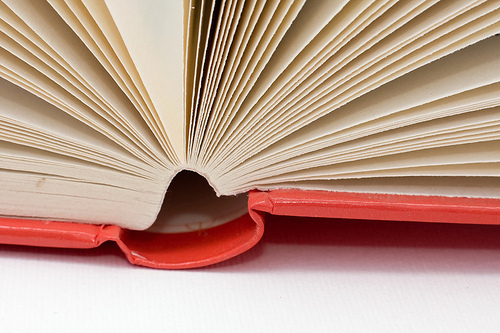
The Beaten Path: Traditional Publishing
There's a common misconception among authors that traditional publishing is less work than self-publishing. It's not true. When you traditionally publish, unless you're already well-established as an author, you have to complete lots and lots of steps.
Write the book. First you have to create a book, but not just any book. If you want to traditionally publish, you need a book that has wide mass appeal - a book that will make money. So be unique, but not too unique. Present an amazing story that isn't too offensive or too "out there," and cross your fingers. You've only just begun. Edit it to heck. Edit that book for story, for grammar and for punctuation. Make every single detail perfect, because if it isn't you won't progress much further down the list of steps.Write the letters. Now it's time to write letters, and the more the better. Get some agent and publisher email addresses together, come up with an amazing pitch, and wait. Send the samples. If your pitch and concept are any good, the agents will write back and ask you for samples. Make sure your submission is perfect. Now wait again.Edit it again. Now if you land the agent and you do all your waiting, you will get a deal with a publisher. You should look over your contract carefully and make sure you understand everything before you sign. This is important, because you may not want to give away your movie rights and other rights just yet. Once the deal is inked, a year or so will pass. Eventually you will receive pages to proofread -- your book, in novel format. Make sure it's perfect. Keep waiting. You will receive a cover to approve (though it may not matter if you don't). You will write a blurb, an "about the author" and you will be asked to submit a photo. It must be a professional photo, nothing too silly or sexy. Eventually you may receive a copy of your book in the mail. You will be responsible for almost all promotion, and that includes arranging your own book signings. Now your manuscript is a novel, and now you have to really start working in order to sell it. Self-Publishing: No Longer the Road Less Taken
Of course, you can always self-publish and dispense with all that waiting instead. Er, well most of the waiting anyway.
Write the book. Create the book that you want to create. Strange? Off-genre? Totally unusual? Good! In self-publishing, almost anything goes.Edit it all over. Yeah, you still have to edit when you self-publish...especially when you self-publish. Make it letter-perfect or your reviewers will eat you for lunch.Get the cover. Either make your own cover, if you're artistic, or hire someone to create it for you. If you don't like the cover, get a new one. It's your cover and your concept, so make sure it's just what you want. But remember the cover should look good on an e-reader and look highly compelling, because there are lots of books out there. Start promoting. Make a trailer, get on social media and start promoting your book as soon as possible -- even before you finish it. You can't do too much marketing. Format. You may have a Word file, but it's not an ebook until it's formatted. Make sure the completed file looks beautiful on all types of readers. Publish. What are you waiting for? Once you've got your blurb, your cover and your completed ebook, publish! Put your book out there in as many places as possible, and never stop promoting.A manuscript can't become a book overnight, and no matter which path you choose it takes a lot of work. Many authors never progress past the manuscript phase, in fact. But if you don't, you'll never know what might have happened. So don't wait. Complete the steps, and become a published author...one way or another.

The Beaten Path: Traditional Publishing
There's a common misconception among authors that traditional publishing is less work than self-publishing. It's not true. When you traditionally publish, unless you're already well-established as an author, you have to complete lots and lots of steps.
Write the book. First you have to create a book, but not just any book. If you want to traditionally publish, you need a book that has wide mass appeal - a book that will make money. So be unique, but not too unique. Present an amazing story that isn't too offensive or too "out there," and cross your fingers. You've only just begun. Edit it to heck. Edit that book for story, for grammar and for punctuation. Make every single detail perfect, because if it isn't you won't progress much further down the list of steps.Write the letters. Now it's time to write letters, and the more the better. Get some agent and publisher email addresses together, come up with an amazing pitch, and wait. Send the samples. If your pitch and concept are any good, the agents will write back and ask you for samples. Make sure your submission is perfect. Now wait again.Edit it again. Now if you land the agent and you do all your waiting, you will get a deal with a publisher. You should look over your contract carefully and make sure you understand everything before you sign. This is important, because you may not want to give away your movie rights and other rights just yet. Once the deal is inked, a year or so will pass. Eventually you will receive pages to proofread -- your book, in novel format. Make sure it's perfect. Keep waiting. You will receive a cover to approve (though it may not matter if you don't). You will write a blurb, an "about the author" and you will be asked to submit a photo. It must be a professional photo, nothing too silly or sexy. Eventually you may receive a copy of your book in the mail. You will be responsible for almost all promotion, and that includes arranging your own book signings. Now your manuscript is a novel, and now you have to really start working in order to sell it. Self-Publishing: No Longer the Road Less Taken
Of course, you can always self-publish and dispense with all that waiting instead. Er, well most of the waiting anyway.
Write the book. Create the book that you want to create. Strange? Off-genre? Totally unusual? Good! In self-publishing, almost anything goes.Edit it all over. Yeah, you still have to edit when you self-publish...especially when you self-publish. Make it letter-perfect or your reviewers will eat you for lunch.Get the cover. Either make your own cover, if you're artistic, or hire someone to create it for you. If you don't like the cover, get a new one. It's your cover and your concept, so make sure it's just what you want. But remember the cover should look good on an e-reader and look highly compelling, because there are lots of books out there. Start promoting. Make a trailer, get on social media and start promoting your book as soon as possible -- even before you finish it. You can't do too much marketing. Format. You may have a Word file, but it's not an ebook until it's formatted. Make sure the completed file looks beautiful on all types of readers. Publish. What are you waiting for? Once you've got your blurb, your cover and your completed ebook, publish! Put your book out there in as many places as possible, and never stop promoting.A manuscript can't become a book overnight, and no matter which path you choose it takes a lot of work. Many authors never progress past the manuscript phase, in fact. But if you don't, you'll never know what might have happened. So don't wait. Complete the steps, and become a published author...one way or another.
Published on December 17, 2013 05:30
December 16, 2013
Writing 101: Book Banning Still in Fashion
Since mankind first figured out a form of writing, there have been stories and books. And for as long as there have been stories and books, there have been banned books.
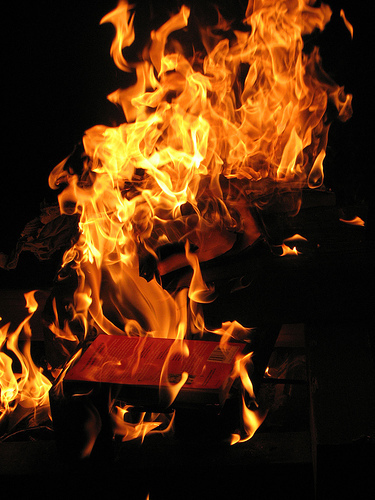
Burning Down the Books
You might think Mark Twain when you hear about book bans and book burning (his stuff has been known to be controversial), but history shows us that the Romans were banning certain source material back before Jesus Christ walked the Earth. That means human beings have been trying to control the reading material of other human beings for at least 2,500 years.
Book burnings have been going on for just about as long, sometimes on a massive scale. Many ancient works that were controversial in their day have been irrevocably lost. And many people believe that today, thanks to things like the First Amendment, book banning no longer happens. Those people are wrong.
It's a tradition that's still being carried out all around the world, even in the United States. Cesar Chavez wrote a book in 2002 that was widely banned. Go back to the 1970s and you'll find plenty of books that were being banned in America. And some indie authors believe they're being banned, or at least blacklisted, even today.
Censorship is a Label, Too
The matter of modern-day banning of indie authors was recently brought to my attention by the Goodreads forums (just when I'm about to give up on forums, which I hate, I find another reason to stick). It's all about the way Amazon chooses to categorize books, you see. And it's got lots of indies angry.
Some are complaining that Amazon is giving far too many books the "erotica" label, effectively blacklisting them to other types of readers. Other authors are seeing their books be pulled from the virtual shelves because Amazon considers the story to have offensive or illegal themes. It's got lots of indies steamed, and it should. Censorship is always a heated issue, and it's bound to raise passions. Authors were given a platform to publish anything, and it's kind of hard for Amazon to start backpedaling now.
But there is another side to the erotica censorship coin. For starters, the indie market is flooded with it. According to a report from Forbes, almost one-third of all self-published titles can be given the erotic label (the findings were based on an analysis from Digital Book World). Among traditionally published titles, erotica makes up about 1 percent of ebooks in the market. And of those erotica titles, almost 10 percent of them contain themes of incest and bestiality.
I can give you an example of it: author Christie Sims. She has published more than 150 titles, and she writes about women having sex with dinosaurs. Her books are available for purchase on Amazon, because she's free to write about this subject matter. It's the kind of thing that some people will find morally reprehensible, and it's enough to make history buffs and science nerds go into an apoplectic fit (EXTINCT! Dinosaurs were EXTINCT by the time humans came around!), but it's on sale for anyone to buy. So just to imagine which books Amazon actually saw fit to ban.
Banning books is not done lightly anymore, if it ever was. It's always a decision that angers people and it almost always backfires (banned books become more popular). But when reading material contains intentionally damaging or incendiary information, the waters get a little muddy. Books that openly depict human-on-dinosaur sex may cause a gag reflex, but they are relatively harmless since they are totally impossible. Books that depict rape of a relative or a minor and other crimes...it's a bit dicier, isn't it?
Someone will always make the attempt to regulate reading material, whether it's through labeling or oppression. And people will always react to it, usually by finding a way to get to that material. So if you get banned, or mislabeled? Take heart. You're carrying on a millennium-old writing tradition.

Burning Down the Books
You might think Mark Twain when you hear about book bans and book burning (his stuff has been known to be controversial), but history shows us that the Romans were banning certain source material back before Jesus Christ walked the Earth. That means human beings have been trying to control the reading material of other human beings for at least 2,500 years.
Book burnings have been going on for just about as long, sometimes on a massive scale. Many ancient works that were controversial in their day have been irrevocably lost. And many people believe that today, thanks to things like the First Amendment, book banning no longer happens. Those people are wrong.
It's a tradition that's still being carried out all around the world, even in the United States. Cesar Chavez wrote a book in 2002 that was widely banned. Go back to the 1970s and you'll find plenty of books that were being banned in America. And some indie authors believe they're being banned, or at least blacklisted, even today.
Censorship is a Label, Too
The matter of modern-day banning of indie authors was recently brought to my attention by the Goodreads forums (just when I'm about to give up on forums, which I hate, I find another reason to stick). It's all about the way Amazon chooses to categorize books, you see. And it's got lots of indies angry.
Some are complaining that Amazon is giving far too many books the "erotica" label, effectively blacklisting them to other types of readers. Other authors are seeing their books be pulled from the virtual shelves because Amazon considers the story to have offensive or illegal themes. It's got lots of indies steamed, and it should. Censorship is always a heated issue, and it's bound to raise passions. Authors were given a platform to publish anything, and it's kind of hard for Amazon to start backpedaling now.
But there is another side to the erotica censorship coin. For starters, the indie market is flooded with it. According to a report from Forbes, almost one-third of all self-published titles can be given the erotic label (the findings were based on an analysis from Digital Book World). Among traditionally published titles, erotica makes up about 1 percent of ebooks in the market. And of those erotica titles, almost 10 percent of them contain themes of incest and bestiality.
I can give you an example of it: author Christie Sims. She has published more than 150 titles, and she writes about women having sex with dinosaurs. Her books are available for purchase on Amazon, because she's free to write about this subject matter. It's the kind of thing that some people will find morally reprehensible, and it's enough to make history buffs and science nerds go into an apoplectic fit (EXTINCT! Dinosaurs were EXTINCT by the time humans came around!), but it's on sale for anyone to buy. So just to imagine which books Amazon actually saw fit to ban.
Banning books is not done lightly anymore, if it ever was. It's always a decision that angers people and it almost always backfires (banned books become more popular). But when reading material contains intentionally damaging or incendiary information, the waters get a little muddy. Books that openly depict human-on-dinosaur sex may cause a gag reflex, but they are relatively harmless since they are totally impossible. Books that depict rape of a relative or a minor and other crimes...it's a bit dicier, isn't it?
Someone will always make the attempt to regulate reading material, whether it's through labeling or oppression. And people will always react to it, usually by finding a way to get to that material. So if you get banned, or mislabeled? Take heart. You're carrying on a millennium-old writing tradition.
Published on December 16, 2013 05:30
December 15, 2013
Indie News: Self-Pubished Authors are BROKE!
Forbes is the authority on money, and according to their findings indie authors aren't getting rich with the self-publishing boom. In fact, some of them aren't making any money at all. If you're in the indie game for the bucks, you've got some re-evaluating to do.
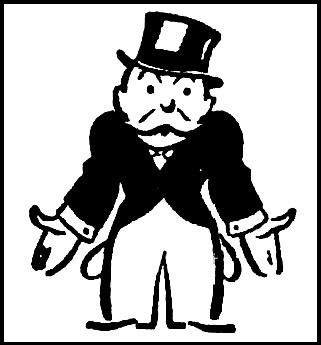
Money Matters
After examining data from Digital Book World and Writer's Digest, Forbes found that self-published authors are pretty cash poor. Their median income is under $5,000 per year. Almost 20 percent of self-published authors get no money from their writing.
Authors who use the traditional publishing route aren't faring that much better. Their median income ranges from $5000 to $9999. The hybrid authors are the ones making the most money, as a matter of fact. Their median income range is $15,000 to $19,999...which, for the number-crunchers out there, is still very close to the national poverty line.
But not every author out there is eating salad. According to the report, almost 2 percent of self-published authors made over $100,000. Almost 9 percent of traditionally published authors reached this level, while over 13 percent of hybrid authors made a 6-figure income.
The study was compiled through October and November 2013. Almost 9000 authors participated in the study.

Money Matters
After examining data from Digital Book World and Writer's Digest, Forbes found that self-published authors are pretty cash poor. Their median income is under $5,000 per year. Almost 20 percent of self-published authors get no money from their writing.
Authors who use the traditional publishing route aren't faring that much better. Their median income ranges from $5000 to $9999. The hybrid authors are the ones making the most money, as a matter of fact. Their median income range is $15,000 to $19,999...which, for the number-crunchers out there, is still very close to the national poverty line.
But not every author out there is eating salad. According to the report, almost 2 percent of self-published authors made over $100,000. Almost 9 percent of traditionally published authors reached this level, while over 13 percent of hybrid authors made a 6-figure income.
The study was compiled through October and November 2013. Almost 9000 authors participated in the study.
Published on December 15, 2013 05:30

